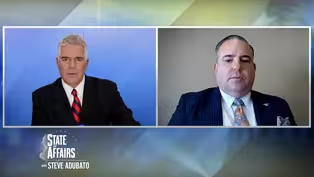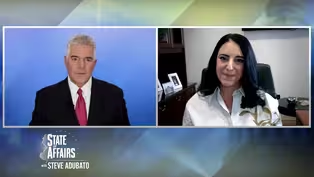State of Affairs with Steve Adubato
Improving urban education & learning outcomes in New Jersey
Clip: Season 9 Episode 7 | 8m 46sVideo has Closed Captions
Improving urban education & learning outcomes in New Jersey
Steve Adubato is joined by Paula White, Executive Director of JerseyCAN, to examine urban education in New Jersey and how local and state policies can improve learning outcomes for all students.
Problems playing video? | Closed Captioning Feedback
Problems playing video? | Closed Captioning Feedback
State of Affairs with Steve Adubato is a local public television program presented by NJ PBS
State of Affairs with Steve Adubato
Improving urban education & learning outcomes in New Jersey
Clip: Season 9 Episode 7 | 8m 46sVideo has Closed Captions
Steve Adubato is joined by Paula White, Executive Director of JerseyCAN, to examine urban education in New Jersey and how local and state policies can improve learning outcomes for all students.
Problems playing video? | Closed Captioning Feedback
How to Watch State of Affairs with Steve Adubato
State of Affairs with Steve Adubato is available to stream on pbs.org and the free PBS App, available on iPhone, Apple TV, Android TV, Android smartphones, Amazon Fire TV, Amazon Fire Tablet, Roku, Samsung Smart TV, and Vizio.
Providing Support for PBS.org
Learn Moreabout PBS online sponsorship[INSPRATIONAL MUSIC STING] - Hi everyone, Steve Adubato.
We kick off the program, part of our miniseries, "Urban Education That Works," with a leader in urban education.
Paula White is the Executive Director of JerseyCAN.
Paula, good to see you.
- Good to see you, Steve, thanks for having me.
- You got it.
The website's up, tell everyone what JerseyCAN is.
- JerseyCAN is an advocacy and policy organization.
We are focused on getting every child in the State of New Jersey a high-quality education, regardless of any of their demographic markers, how much their parents make, what their zip code is.
We believe that every child deserves a high-quality education.
- Along those lines, this National Report Card, the National Assessment of Educational Progress, how are Jersey urban public schools doing?
- New Jersey's urban public schools are not doing well, and, you know, if there there's anything that I would want our listeners to leave with, it's just, you know, three realities, which is that we have to level up for all learners in the State of New Jersey, and, right now, that is not happening.
We also need to recognize that better is possible, and we have national examples of where that is the case.
And, finally, it's not just about hard work, but the right work, and that's what will get us there.
- Let me ask you this.
At a time like this, I know states get compared all the time with each other, but this got my attention.
Fourth-grade students in states like Mississippi, Kentucky, South Carolina, their reading proficiency, unless I have this wrong, is higher than fourth-grade students in socioeconomically disadvantaged communities?
- Steve, you're exactly right.
The reality is that four of the 10 poorest states in the United States of America, their fourth-graders, who are socioeconomically disadvantaged, are actually reading more proficiently than are socioeconomically disadvantaged fourth-graders in the State of New Jersey.
And that is why we know that better is possible, because, of course, we are on the other end of that spectrum, we are one of the wealthiest states in the union.
And so, certainly what we know is that if they can do it, we can do it too.
New Jersey has been a leader in education, but we have to level up for all learners in our state.
- You and your colleagues at JerseyCAN are engaged and involved, and we've done a series of interviews looking at literacy in the State of New Jersey.
You're very much involved in literacy as an advocate, please, talk about that.
- We formed a coalition called the New Jersey Legacy of Literacy Coalition.
And what is important to know about that is that, this is not a flavor of the month idea.
It is really about saying the legacy of literacy must remain constant in the State of New Jersey, and that we must focus on it across party lines, regardless of who gets in the governor's seat, that this is something that we must focus on.
We've got cross-sector organizations, parent organizations, nonprofit organizations, all-teacher organizations, all focused on this idea that we need every child in the State of New Jersey reading proficiently.
We also have folks from the business community, and, as you can well imagine, these folks are very much invested in the idea that if they're gonna be able to stay in our state and attract local state-level talent, we've gotta have readers.
As it relates to who New Jersey's next governor will be after Governor Murphy, what do you believe the most significant top urban education policy, agenda item should be?
Please, Paula.
- We certainly need to implement our policies and recent legislation that's been passed around literacy.
We worked very hard with Senate Majority Leader, Teresa Ruiz, to pass legislation that would have some teeth that would focus on teacher preparation and support, that would focus on using the right curriculum, screening students on a regular basis, notifying parents of where their students fall along the continuum of reading, and making sure that their high-quality instructional material is in the classroom.
So what we need is proper implementation, because, as I stated earlier, it's not just about hard work, it's about the right work.
Because our educators in the State of New Jersey are working very hard, but if we're not doing the right work, we're not gonna see the results.
So it will be important for the governor to whomever is in the commissioner's seat, to make sure that we are incentivizing and sending a clear message to the districts in the State of New Jersey; "This is what works, and we are supporting that based on the guidance that we're giving you, based on the grants that are available to districts.
You know, we are gonna be very clear about what works and that is what we will incentivize, and that is what we will support."
So, for example, we wanna make sure that we are not supporting practices that don't work.
A lot of students have been taught to guess what a word is, or "Look at the picture to help you read."
Well, we know that a picture doesn't help you read, right?
Because, you could look at something, it could be a stone, but it could be a rock, it could be a pebble.
You need to understand how the code of the language works.
And so, these are the kinds of strategies that we want to say, "You cannot use these strategies, and if you do, we will not support your district as far as incentivizing around grants and things of that nature."
It's not just hard work, it's the right work.
- Interesting how Paula talks about what doesn't work.
And if we're doing this series, "Urban Education That Works," we need to understand, based on the evidence, what does not work, and one more quick question on this.
There are folks who say, "Let's get rid of the Federal Department of Education," and, "It doesn't really impact students' lives," well, there are real dollars, real resources, as it relates to urban education, particularly K through 12, what are your concerns?
And, again, it's late March, we don't know really what the ultimate makeup is gonna be on the federal government side as it relates to the Department of Education.
What's your greatest concern, Paula?
- You know, I've never had aspirations to be a weather person, and, certainly, you know, trying to predict what will happen here, you know, may feel a little bit like a fool's errand, but what I will say is that, to the extent that we have federal laws that govern what must happen in terms of how we support our learners, and knowing that every single learner is worthy of support and needs to be supported, regardless if they are students with disabilities and so on, it will be incumbent upon us to follow federal law, regardless of what the pass-through mechanism is for those dollars.
Those dollars need to be allocated to our students and they need to have them.
But, you know, we know that education is primarily a local concern, we know that education does not appear in the Constitution, that word.
So, really, it's about our local, you know, primarily about the state, and are we optimizing where we can?
Are we focusing on the locus of our control, which is at the state level.
So we have to optimize all of the levers at our disposal.
- Paula White, Executive Director of JerseyCAN, their website's been up throughout the entire segment, make sure you check it out.
Paula, thank you so much for joining us, we appreciate it.
- It's been a pleasure.
Thank you, Steve.
- You got it.
Stay with us, we'll be right back.
- [Narrator] State of Affairs with Steve Adubato is a production of the Caucus Educational Corporation.
Funding has been provided by EJI, Excellence in Medicine Awards.
New Jersey Children’s Foundation.
Delta Dental of New Jersey.
NJM Insurance Group.
United Airlines.
The Port Authority of New York and New Jersey.
PSE&G.
NJ Best, New Jersey’s five-two-nine college savings plan.
And by The Adler Aphasia Center.
Promotional support provided by New Jersey Monthly.
And by Meadowlands Media.
- At the New Jersey Children's Foundation, we believe all children should have access to a high quality public education regardless of where they live.
We believe schools should place students on paths to success, and we invest in schools and educators who are meeting those needs.
Whatever your seat on the bus: student, parent, teacher, business leader, you have a role in our mission.
In Newark, district and charter schools show great education is possible.
We're working to unite people across the city and state to provide students with the schools they deserve.
Diversifying and rebuilding trust in the NJ police force
Video has Closed Captions
Clip: S9 Ep7 | 9m 41s | Diversifying and rebuilding trust in the NJ police force (9m 41s)
Misconceptions about vaccines for preventable illnesses
Video has Closed Captions
Clip: S9 Ep7 | 9m 21s | Misconceptions about vaccines for preventable illnesses (9m 21s)
Providing Support for PBS.org
Learn Moreabout PBS online sponsorship
- News and Public Affairs

Top journalists deliver compelling original analysis of the hour's headlines.

- News and Public Affairs

FRONTLINE is investigative journalism that questions, explains and changes our world.












Support for PBS provided by:
State of Affairs with Steve Adubato is a local public television program presented by NJ PBS

